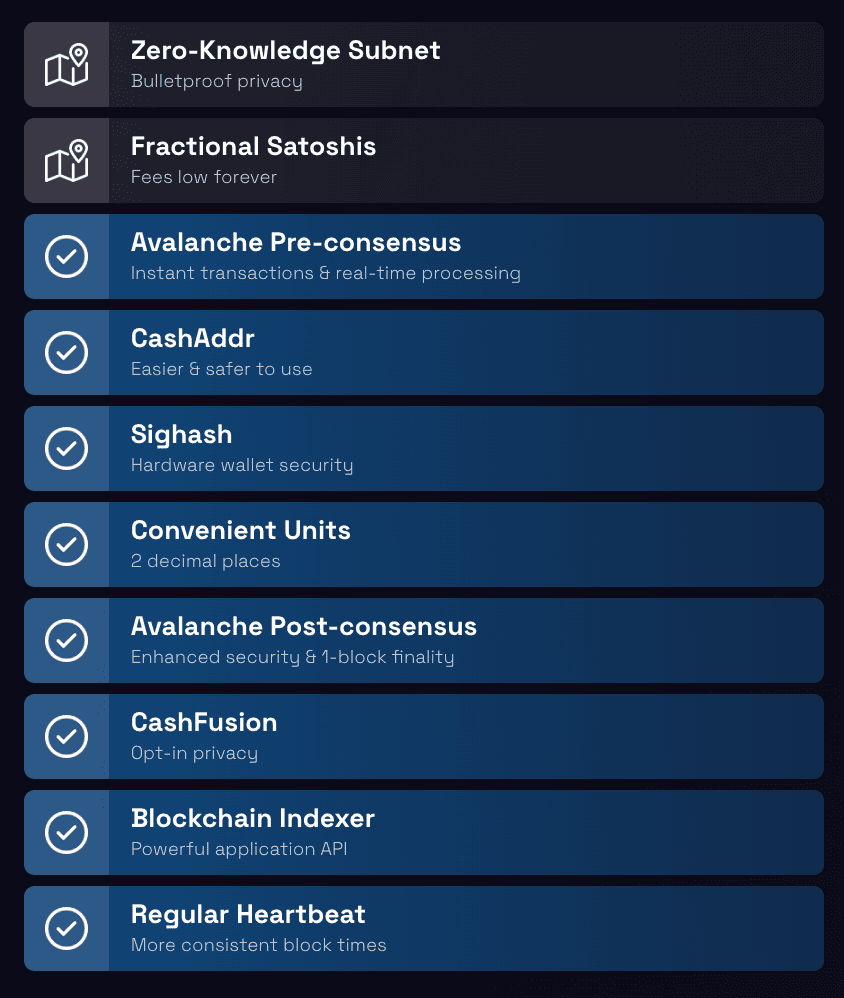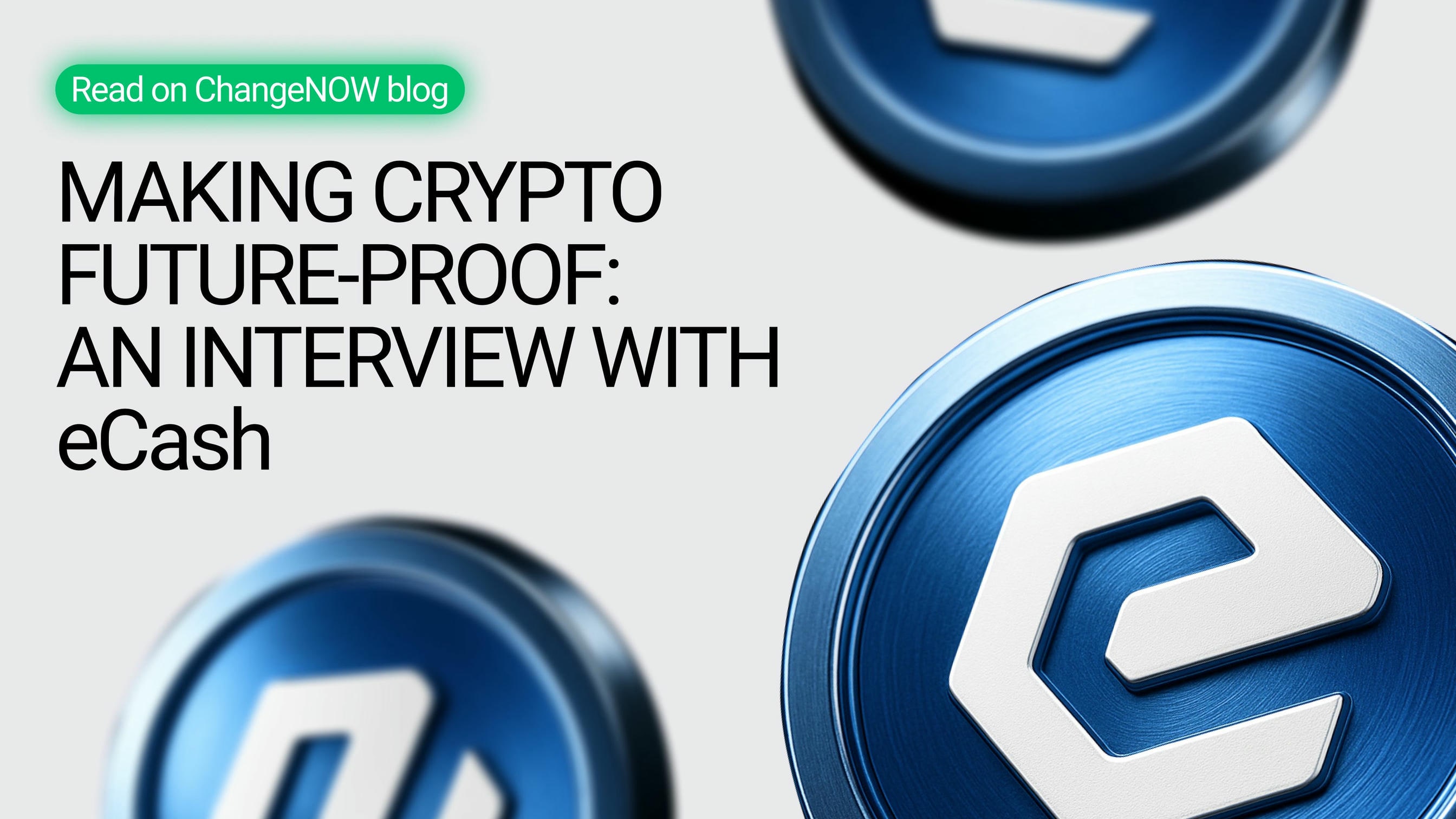Introduction to eCash's Innovative Approach
eCash offers a unique solution to the scalability and speed challenges inherent in cryptocurrency transactions by combining Nakamoto and Avalanche consensus mechanisms. This approach aims to provide fast transaction finality, enhanced security, and robust privacy features, positioning eCash for widespread adoption in the digital payments landscape. The development team has focused on creating a blockchain network capable of competing with traditional financial systems, addressing the limitations faced by earlier cryptocurrencies like Bitcoin.
Key Features and Advantages of eCash
- •eCash’s Unique Consensus Mechanism: eCash merges Nakamoto and Avalanche consensus, enabling transaction finality in under three seconds. This hybrid model delivers both speed and security without sacrificing decentralization.
- •Scalability and Security: Engineered for mass adoption, eCash addresses scalability issues that affect blockchains such as Bitcoin, Ethereum, and Solana. It enhances privacy, security, and liquidity.
- •Privacy Solutions: User privacy is a core focus, with features like CashFusion, a non-custodial CoinJoin protocol. Future plans include implementing a Zero-Knowledge (ZK) subnet for advanced privacy protection.
- •Adoption and Ecosystem Growth: eCash promotes organic adoption by providing essential infrastructure tools, such as the Chronik indexer, which is already utilized by projects like BCH and DOGE.
- •Future Roadmap: The roadmap includes dynamic fees, dynamic block sizes, and integration with the Decentralized Finance (DeFi) ecosystem, aiming for zero-fee transactions and broader DeFi participation.
The Vision: Faster, Decentralized, and More Scalable Payments
Since 2016, eCash, formerly Bitcoin ABC, has been dedicated to improving Bitcoin technology with the mission of establishing a decentralized, scalable, and rapid payment system. The team's objective is to build a blockchain network that can effectively rival traditional financial systems by resolving the speed and scalability issues that have plagued Bitcoin.
The core of eCash's functionality lies in its distinctive combination of Nakamoto consensus and the Avalanche consensus mechanism. This synergy allows eCash to process transactions with finality in less than three seconds, a significant advancement for digital cash technology. Notably, eCash is the first Proof-of-Work (PoW) blockchain to achieve such swift transaction finality.
"We are optimizing for scale because it is important both from a technological and an economic point of view."
A larger network capacity is understood to improve privacy, security, and liquidity, facilitating the unimpeded flow of funds. The design prioritizes a scalable blockchain, aiming to make eCash more than just another cryptocurrency; it is engineered to accommodate mass adoption seamlessly, a challenge many existing chains struggle to overcome.
eCash's Pre-Consensus: A Transformative Innovation
While many blockchain networks claim high speeds, eCash distinguishes itself with a commitment to robust, decentralized solutions. Some networks achieve rapid transaction finality by compromising decentralization or employing complex, centralized validator models. In contrast, eCash implements a real-time consensus mechanism that eliminates the need for specialized validators. Its nodes, leveraging Avalanche, engage in fast, collaborative decision-making processes, ensuring transaction completion within three seconds. This approach effectively resolves the perceived conflict between speed and security.
"It's a mix of security and flexibility, with the ability to change parameters on the fly without needing hard forks."
The eCash team asserts that its hybrid Avalanche/Nakamoto consensus model offers a more comprehensive and adaptable security framework compared to Bitcoin's network. This flexibility, allowing parameter adjustments without hard forks, sets eCash apart from blockchains like Bitcoin, Ethereum, and Solana, whose scalability is often constrained by their fundamental architecture or reliance on centralized validation.
Comparative Analysis: eCash vs. Bitcoin, Ethereum, and Solana
Bitcoin, the pioneering cryptocurrency, faces inherent scalability limitations due to its small block size and resistance to fundamental changes, resulting in slower transaction throughput compared to newer blockchains. While solutions like the Lightning Network aim to improve this, eCash's enhanced PoW model offers a more direct path to higher performance.
Ethereum introduced flexibility and programmability through smart contracts, but its account-based model complicates scaling and limits parallel processing. Solana has achieved high throughput by introducing complexity and centralizing validation, requiring powerful hardware that can potentially weaken the network under stress.
eCash presents a solution to these challenges by integrating the simplicity and security of Bitcoin's PoW with the growth capabilities of Avalanche consensus.
"We don't want to be another gold competitor like Bitcoin."
The team envisions eCash as a global digital cash system. Its high scalability, low fees, and robust security make it an attractive option for everyday transactions. While focusing on the cash use case, eCash maintains the same supply schedule as Bitcoin.
Prioritizing Security and Privacy on eCash
Security is a paramount concern for eCash. The integration of Avalanche consensus provides strong resistance against 51% attacks. Each finalized transaction is backed by a security guarantee exceeding $4 million at the current price of eCash, a level of protection comparable to approximately 11 blocks on Bitcoin. This guarantee is expected to grow with the addition of more Avalanche-enabled staking nodes and potential increases in XEC's valuation.
eCash is also committed to user privacy. While operating as a transparent blockchain, it offers CashFusion, a non-custodial CoinJoin protocol designed to obscure funds and enhance user privacy and fungibility. This protocol has influenced technologies like the Wabisabi protocol used in Wasabi Wallet.
The team highlights that eCash's scalability is vital for improving privacy. The network's capacity to handle numerous users and high transaction volumes without excessive fee increases allows for multiple rounds of CashFusion, thereby increasing the anonymity set and enhancing privacy protection.
A Zero-Knowledge (ZK) subnet has been a long-standing objective on eCash's roadmap.

Although currently in the conceptual phase, the implementation of a ZK subnet would offer optional, robust privacy protection for users, further bolstering transaction security and confidentiality.
The Path to Widespread Adoption
Achieving widespread adoption is often the most significant hurdle for cryptocurrencies. eCash adopts a measured approach, focusing on preparing the network for scale in a non-disruptive manner before encouraging rapid user growth.
While the eCash ecosystem is still developing, its infrastructure has already found utility in other projects. For instance, the Chronik indexer is being used by projects within the BCH and DOGE communities, demonstrating eCash's ability to provide valuable tools for developers and businesses across the crypto landscape.
"We want the right people to see eCash—tech-savvy business owners and developers who see the potential of our network."
The team believes that products requiring high flexibility, reliability, and performance will naturally gravitate to eCash over time. This strategy emphasizes building a strong foundation before seeking broad visibility.
Furthermore, the MUSD stablecoin, the first USD stablecoin issued by a public entity—the Commonwealth of the Northern Mariana Islands—and deployed on the eCash network, underscores eCash's reliability and its capacity to support innovative financial products.
eCash's Future Development and Roadmap
eCash possesses an ambitious roadmap for future development. The recent Pre-Consensus upgrade is foundational for upcoming features such as dynamic fees and dynamic block sizes. These enhancements will enable the network to adjust block size and fees based on demand without requiring hard forks, a capability enabled by the underlying Avalanche Pre-Consensus technology. Dynamic fees also pave the way for the implementation of zero-fee transactions.
Future plans include integrating eCash with the broader DeFi ecosystem through an EVM-subnet. This integration would allow for token swaps between eCash and other DeFi platforms, attracting users and developers already active in decentralized finance.
The eCash team is committed to developing a network that is not merely another altcoin but a robust, scalable, and extensible solution accessible globally.
Conclusion: eCash as a Future-Proof Payment System
eCash stands as a comprehensive payment system integrating decentralization, security, extensibility, and scalability. Its advanced technologies, including the Avalanche/Nakamoto hybrid consensus and the Chronik Indexer, position it effectively to address the challenges faced by contemporary blockchain networks.
By building the necessary infrastructure and tools, eCash aims for a sustainable, scalable, and secure system. While widespread adoption may take time, its unique features and capabilities are essential for a cryptocurrency to compete effectively. eCash represents a future-proof solution that balances innovation with reliability, suitable for everyday transactions and large-scale applications.

